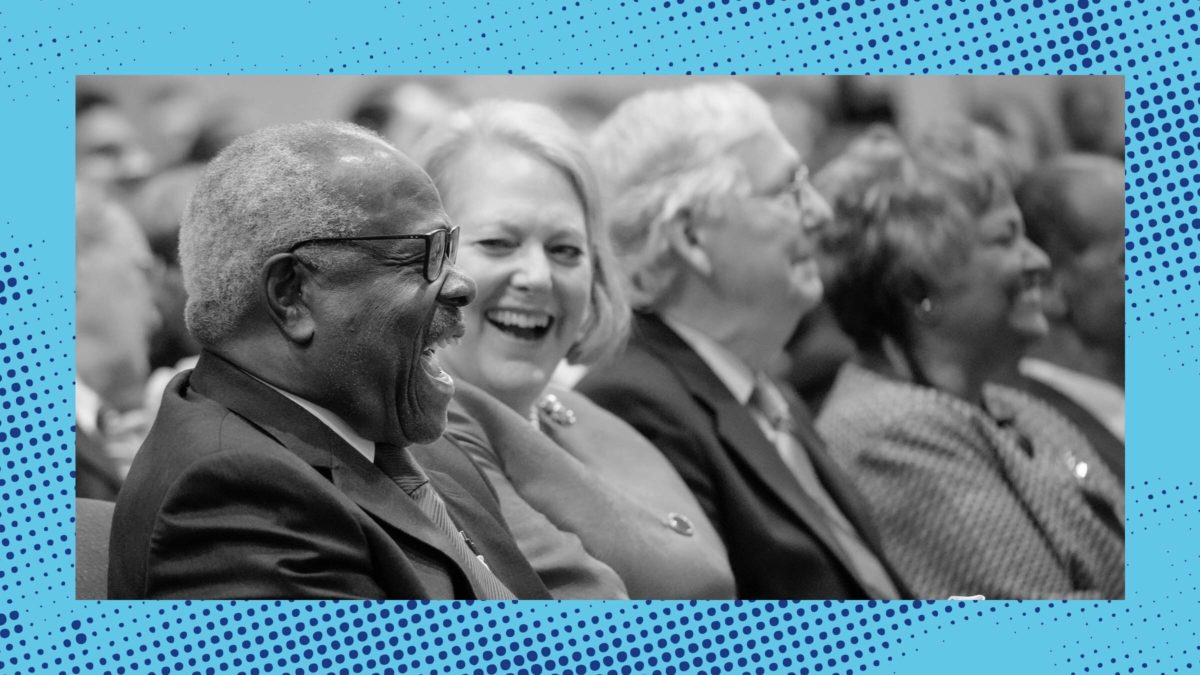An ironclad law of conservative legal punditry is that whenever anyone to the right of Joe Lieberman does something to make people upset, one or more of the dweebs at National Review will come galloping to their defense. That defense may not be timely, persuasive, or even coherent, but it will be there, dammit, right below the latest breathless update on Hunter Biden’s laptop, and right above a geotargeted sponcon article about the innovative set of toenail clippers every senior citizen must own in 2022.
This week’s short straw went to Andrew McCarthy, who was tasked with defending the honor of Justice Clarence Thomas in the wake of revelations that his wife, Ginni, was an unsettlingly active participant in efforts to overturn the 2020 election. Calls for Thomas’s recusal from future election-related matters—let alone something resembling an actual investigation into the Thomas family’s conduct—are “transparently partisan politics, nothing more,” McCarthy asserts. “Having a politically active husband or wife is simply not disqualifying for a jurist.”
McCarthy’s column meanders between conjecture, whataboutism, and non sequitur, but the core of his argument is that Americans needn’t concern themselves with what Clarence and Ginni Thomas are up to these days, because Clarence and Ginni Thomas, paragons of patriotic virtue, super-duper-pinky-swear there’s nothing for anyone to worry about. “As Ginni (who is a friend of mine) has publicly explained, the Thomases maintain a wall of separation regarding their respective professional lives to avoid conflicts,” McCarthy writes. “Justice Thomas does not discuss the Court’s pending cases with Ginni, and Ginni does not involve the justice in her political activities—not that either of them would try to become involved in the other’s work.” Already, scientists believe the credulousness that infuses this paragraph is among the planet’s most promising potential sources of renewable energy.
Drawing on his experience as an ex-prosecutor, McCarthy goes on to argue that managing conflicts of interest is a relatively simple task, especially for married couples who learn to “habitually keep professional activities and confidences off-limits.” Absent from his analysis is a shred of evidence that this nice-sounding axiom accurately describes the Thomases’ behavior. Invoking it as a substantive defense here is roughly analogous to dismissing questions about the masked person sprinting out of the bank holding a sack of cash, since it is generally understood that robbing banks is frowned upon.
Also absent from McCarthy’s analysis is even a cursory acknowledgement of the decades of reporting on Clarence and Ginnni Thomas as ideologically aligned culture warriors who consider each other their closest confidantes—a public image they’ve happily, unapologetically burnished. That context, along with the simple fact that Thomas enjoys life tenure and is accountable to no one, might prompt a reasonable person to wonder whether the ol’ trust-me-we-are-buds defense is remotely persuasive or sufficient. “It is not that hard to avoid becoming biased if one is making a conscientious effort to avoid sources of potential bias,” McCarthy concludes, at once demonstrating that he knows as little about how bias works as he does about Clarence Thomas.
As silly as this column is, it fits neatly into the conservative legal movement’s tradition of exploiting the legal profession’s neutral, apolitical reputation for partisan gain. Much of McCarthy’s argument boils down to the notion that judges can be trusted to do the proverbial right thing simply because they are judges. Sure, on the one hand, while Ginni Thomas’s husband was considering the president’s challenges to election results, she was spam-texting the White House Chief of Staff with words of encouragement and the occasional QAnon conspiracy theory. On the other hand, if Clarence Thomas—that’s Justice Clarence Thomas to you—says he didn’t think anything of it, who are we, the not-life-tenured-judges masses, to question him?
I obviously don’t know what Clarence and Ginni Thomas were talking about over their morning coffee last winter. (Alas, he stopped returning my texts ages ago.) But Q-curious types are rarely shy about recapping their marathon YouTube sessions, and the notion that these fixtures of conservative politics maintained strict firewalls about their interactions with the biggest news story in Washington for months on end seems, to put it delicately, far-fetched. This is not a unique insight into the Thomases’ relationship; it’s a baseline observation about how relationships work. If I am upset enough to text Mark Meadows (who still sometimes texts me back) about something, chances are good the subject is going to come up in conversation in my house.
Fortunately for the Thomases, a legal culture that at every turn reifies the myth of an apolitical judiciary affords them the benefit of the doubt. For an intertwined political party and ideological movement that together control a six-justice supermajority on the Court, this notion continues to function as a powerful shield against meaningful accountability. Until Democrats are willing, at a bare minimum, to tack congressional subpoenas to the Thomases’ front door and get some actual answers, they are going to keep getting away with it.

